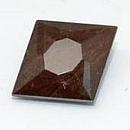|
|
||||||||||||||||
|
||||||||||||||||
|
||||||
|
|
|
|
Sarcopside
|
|
| | |
| Discovered in 1868; IMA status: Valid (pre-IMA; Grandfathered) | ||
|
| ||
|
Chemistry |
|
|
| |
|
(Fe2+,Mn2+,Mg)3(PO4)2 | |
|
|
Iron Manganese Magnesium Phosphate |
|
Emperical Chemical Formula: |
Fe2+2.4Mn2+0.3Mg0.3(PO4)1.9 |
|
Molecular Weight: |
338.25 gm |
|
Composition: |
Magnesium |
2.16 % |
Mg |
3.57 % |
MgO |
|
|
Manganese |
4.87 % |
Mn |
6.29 % |
MnO |
|
|
Iron |
39.63 % |
Fe |
50.98 % |
FeO |
|
|
Phosphorus |
17.40 % |
P |
39.87 % |
P2O5 |
|
|
Oxygen |
35.95 % |
O |
|
|
|
|
|
100.00 % |
|
100.71 % |
|
|
|
|
||||
|
Classification |
|
|
| |
|
Phosphates, Arsenates, Vanadates | |
|
7/A.04-10 | |
|
|
8 : PHOSPHATES, ARSENATES, VANADATES
|
|
Related to: |
Sarcopside Group. Isostructural with Chopinite. Ferrous iron analogue of Chopinite. |
|
Members of Group: |
Sarcopside Group: Chopinite, Sarcopside, Zavalíaite |
|
Varieties: |
None |
|
Synonyms: |
ICSD 72049, PDF 39-341 |
|
|
|
|
Crystal Data |
|
|
|
|
|
Fibrous, to 1 mm, more commonly platy or lamellar, in veinlets in oriented intergrowth with graftonite or triphylite. |
|
|
Polysynthetic on {001}, common |
|
|
|
|
|
Physical Properties |
|
|
|
|
|
Good on {100}and {001}; poor on {010}. Distinct on a plane approximately perpendicular to the fibers, and another less distinct parallel to the fiber lenght (=[001] - ?). |
|
|
Splintery to fibrous |
|
|
Brittle |
|
|
4.0 |
|
|
3.64 - 3.73 (g/cm3) |
|
|
None |
|
|
Not Radioactive |
|
|
|
|
|
Optical Properties |
|
|
|
|
|
Gray-pink, red-brown, brown (slightly altered), blue, lavender, green; flesh-red in transmitted light, rarely white. |
|
|
Translucent to opaque |
|
|
Resinous, silky to waxy |
|
|
1.670 - 1.734 Biaxial ( - ) |
|
|
0.060 |
|
|
Perceptible; r > v |
|
|
n/a |
|
|
|
|
|
Occurances |
|
|
|
|
|
Geological Setting: |
Formed along with Graftonite, probably by exsolution from Triphylite, in complex zoned granite pegmatites. |
|
Common Associations: |
Graftonite, Vivianite, Huréaulite, Triphylite |
|
Common Impurities: |
n/a |
|
Type Locality: |
Michałkowa (Michelsdorf), Sowie Mts, Sudetes Mts, Lower Silesia (Dolnośląskie), Poland |
|
Year Discovered: |
1868 |
|
View mineral photos: | |
|
|
|
|
More Information |
|
|
|
|
|
| |
|
|
|
|
Locations
for finding : From Góry Sowie (Michelsdorf),
in the Eulengebirge, Silesia, Poland. At Otov and Domažlice,
Czech Republic. From the Norrö pegmatite, on Rånö
Island, and in the Berg quarry, near Sollefteå,
Västerbotten, Sweden. At Hagendorf, Bavaria, Germany.
In the USA, in New Hampshire, at the Gingrass Farm,
near Deering, Hillsboro County, in the G.E. Smith mine,
Newport, Sullivan County, and from the DeMott and French
King No. 2 mines, East Alstead, Cheshire County; in
South Dakota, at the Bull Moose and Victory mines, and
the Lofton prospect, near Custer, Custer County From
the Énio pegmatite mine, northeast of Galiléia,
Minas Gerais, Brazil. In the Tsaobismund pegmatite,
60 km south of Karibib, Namibia. |
|
|
We
have not photographed our Sarcopside
gems. Please
check back soon. |
